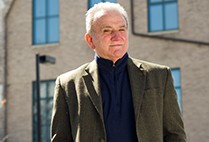In 1965, at a time when men dominated her field, Betty Zisk joined Boston University’s political science department, a pioneering move characteristic of the strong-willed professor who would go on to help found the Massachusetts Green Party.
A champion of social justice, she was also deeply committed to her students, seizing opportunities to serve on the reading committees for their theses. Zisk “combined scholarship and activism with a willingness to meet with and help students,” says Christine Rossell, a College of Arts & Sciences professor of political science.
Zisk, a CAS professor emerita of political science who taught at BU for 46 years until her retirement in 2011, died on October 19, 2014. She was 83.
Zisk attended Swarthmore College, whose Quaker (Religious Society of Friends) roots inspired her to join that faith.
“First and foremost she was a Quaker and an activist,” her friend Charmarie Blaisdell told the Boston Globe. “She was devoted to issues of social justice.”
Zisk earned a master’s degree in political science at Haverford College, another school in the Quaker Consortium, and a PhD at Stanford University. Following in her professor father’s footsteps, she joined BU’s political science faculty a year later.
In his memorial resolution to the CAS faculty, Graham Wilson, professor and chair of political science, recalled that Zisk would talk for hours with her students outside of class and was known to visit students in the hospital. She stood by her beliefs and her students with the same determination; even colleagues who disagreed with her political opinions considered her “a worthy adversary,” according to Rossell.
She was a pacifist who had a passion for the environment, and she supported Ralph Nader’s presidential bid as a Green Party candidate in 2000, according to the Globe. She often wove her personal interests in peace movements and environmental activism into her teaching; one of her popular courses was an honors seminar in nature, ecology, and politics.
She also taught in the BU program for prisoners working toward their bachelor’s degrees. She “had this fabulous institutional memory, and could always be counted on for advice,” Rossell says.
Zisk wrote dozens of articles and four books on subjects ranging from political activism to the media’s role in politics to grassroots movements. She served on the editorial boards of numerous political science journals.
For her dedication to teaching and scholarship, Zisk earned many prestigious awards, including the 1995 Distinguished Lifetime Achievement Award from the American Political Science Association. In 2001, the College of Arts & Sciences bestowed her with the Outstanding Teaching Award in the Honors Program.
During her tenure at BU, she was a member of the political science senior faculty that included such outspoken and influential members as Howard Zinn and Murray Levin, two late professors emeritus, and Frances Fox Piven, now a professor of political science and sociology at the City University of New York.
But, according to Rossell, Zisk was “never part of a group. She always did her own thing.” She would often throw parties at her Burlington home and invite graduate students. “Not many professors did that, not at that time,” Rossell recalls. “She was the senior faculty member who really engaged with students. We miss her a lot.”













































Related Stories
Controversial Civil Rights Activist Angela Davis Draws Big Crowd to BU Talk
“Through black history we learn the best of the history of the United States of America,” she tells packed house
Office Hours: Elizabeth Co
CAS senior lecturer in biology gives tips on how students can master huge amounts of information
Popular Activist and Musician Killed by Truck
Alum Marcia Deihl struck while riding bike in Cambridge
Post Your Comment